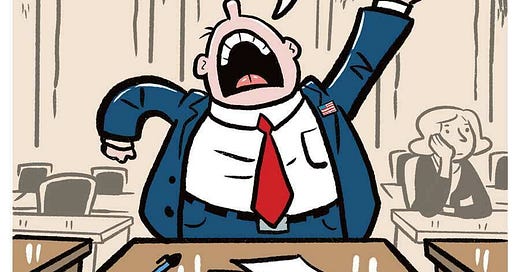David French: Congressional dysfunction is a big problem for democracy
But it is the filibuster, not the Constitution, that is crippling Congress
Readers of Perilous Times should pay close attention to David French’s work - he is a fierce advocate for our constitutional democracy, a close student of the Supreme Court, a U.S. Army vet, an evangelical Christian and a conservative. He regularly contributes to the Atlantic and writes The French Press for the conservative on-line media outlet - The Dispatch.
His article today “The Constitution Isn’t Working” is both spot on and a bit obtuse at the same time. It is worth discussing.
French expands on the same point as I did last week about how recent Supreme Court cases were demanding that Congress do its job. In both the climate change case and the “remain in Mexico” immigration case - French points out that the Court nullified executive agency actions that were not supported by clear, direct edicts from the Congress. He also rightly points out that the Constitution gives the greatest range of powers to address problems to the Congress, not to the president and not to the federal judiciary. So, if we want to deal with the myriad of problems facing society - large scale migration, climate change, health care inequity and so on - we need an active Congress to do so.
But we have a Congress that barely does anything. Indeed, over recent decades it has struggled to fulfill the bare minimum of its responsibilities like passing an annual budget enabling the government to stay open. On a number of occasions, congressional dysfunction almost caused the government to default on its debt obligations, which might have caused a self-inflicted financial crisis.
French blames congressional dysfunction on political partisanship - and there is certainly much truth to that. The inability for the parties to work together on most issues means that it has become exceedingly difficult to cobble together the political majorities necessary to pass legislation. This is especially when - like now - seats in the Congress are divided almost 50/50.
But where French falls short is the failure to attribute the blame for Congress’ inactivity in the face of grave national problems to the Senate filibuster - a rule that has absolutely no constitutional basis.
I will elaborate in future posts - but the filibuster is more destructive than most people understand. It does not just require 60 votes to pass legislation - but it, together with other Senate rules, gives individual senators the power to grind the Senate to a creeping halt - meaning that even legislation supported by 70, 80, or 90 senators routinely does not pass. Does the filibuster protect political minorities - sure. But it does so at the expense of the general democratic principle of majority rule.
We can also lay at the doorstep of the filibuster American’s declining faith in the ability of our government to serve the needs of our nation. Consider this: voters delivered congressional majorities to the parties of each of our last five presidents at the outset of their administrations (in 1992, 2000 (with a 50/50 Senate), 2008, 2016, and 2020 (again, with a 50/50 Senate)). So, five times voters endorsed a pathway for the country and expected results. But the filibuster prevents Congress from enacting anywhere close to a president’s full agenda, breeding discontent among the voters, and a general cynicism about our government in general.
Our Constitution could work fine - even in an era of hyper-partisanship. But it can’t - and doesn’t - work when you have both partisanship and the extra-constitutional filibuster rule.





Eliminating the filibuster when Democrats are in control, however barely, is very tempting, but what happens when Republicans control Congress and the White House? With gerrymandering and the electoral college, Republicans could control Washington against the preferences of a national majority. Proceed cautiously.